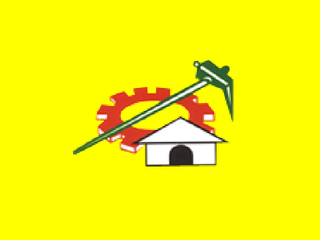This article needs additional citations for verification .(December 2015) (Learn how and when to remove this template message) |

The Republican Party of India (Democratic) was a political party in India. [1] The leader and party president of the party was T.M. Kamble. After T.M. Kamble's death, Nanda T. Kamble became the president of the party.
A political party is an organized group of people, often with common views, who come together to contest elections and hold power in the government. The party agrees on some proposed policies and programmes, with a view to promoting the collective good or furthering their supporters' interests.

India, also known as the Republic of India, is a country in South Asia. It is the seventh largest country by area and with more than 1.3 billion people, it is the second most populous country as well as the most populous democracy in the world. Bounded by the Indian Ocean on the south, the Arabian Sea on the southwest, and the Bay of Bengal on the southeast, it shares land borders with Pakistan to the west; China, Nepal, and Bhutan to the northeast; and Bangladesh and Myanmar to the east. In the Indian Ocean, India is in the vicinity of Sri Lanka and the Maldives, while its Andaman and Nicobar Islands share a maritime border with Thailand and Indonesia.
The party was a splinter group of the Republican Party of India. After the 2004 election, it had minor representation within the Lok Sabha and was a constituent of the ruling United Progressive Alliance. Its presence was limited to Maharashtra.
The Republican Party of India is a political party in India. It has its roots in the Scheduled Castes Federation led by B. R. Ambedkar. The 'Training School for Entrance to Politics' was established by Ambedkar in 1956 which was to serve as an entry point to the Republican Party of India (RPI). The first batch of the school consisted of 15 students. Its first batch turned out to be last batch as the school was closed after Ambedkar's death in 1956.

The Lok Sabha is the lower house of India's bicameral Parliament, with the upper house being the Rajya Sabha. Members of the Lok Sabha are elected by adult universal suffrage and a first-past-the-post system to represent their respective constituencies, and they hold their seats for five years or until the body is dissolved by the President on the advice of the council of ministers. The house meets in the Lok Sabha Chambers of the Sansad Bhavan in New Delhi.
United Progressive Alliance (UPA) is a coalition of left and centre-left political parties in India formed after the 2004 general election. The largest member party of the UPA is the INC, whose Former National President Sonia Gandhi is chairperson of the UPA. It formed a government with support from some other left-aligned parties in 2004.
On 5 May 2011, the RP(D) aligned itself with the BJP-led NDA. In 2015, it was listed as one of the 26 political allies for prime minister candidate- Narendra Modi. [2]

The Bharatiya Janata Party is one of the two major political parties in India, along with the Indian National Congress. As of 2018, it is the country's largest political party in terms of representation in the national parliament and state assemblies, and it is the world's largest party in terms of primary membership. BJP is a right-wing party, and its policy has historically reflected Hindu nationalist positions. It has close ideological and organisational links to the Rashtriya Swayamsevak Sangh (RSS).
The National Democratic Alliance (NDA) is a coalition of Progressive centre-right to right-wing political parties in India. At the time of its formation in 1998, it was led by the BJP and had 13 constituent parties. Its chairman was late Prime Minister Atal Bihari Vajpayee. Also representing the alliance are L. K. Advani, former Deputy Prime Minister, who is the acting chairman of the Alliance, Narendra Modi, current Prime Minister and the Leader of the House in Lok Sabha; and Arun Jaitley, Leader of the House in Rajya Sabha and Finance minister. The coalition ruled from 1998 to 2004. The alliance returned to power in the 2014 General election with a combined vote share of 38.5%. Its leader, Narendra Modi, was sworn in as Prime Minister of India on 26 May 2014.

Narendra Damodardas Modi is an Indian politician serving as the 14th and current Prime Minister of India since 2014. He was the Chief Minister of Gujarat from 2001 to 2014, and is the Member of Parliament for Varanasi. Modi is a member of the Bharatiya Janata Party (BJP), and of the Rashtriya Swayamsevak Sangh (RSS), a Hindu nationalist volunteer organisation.
On 28 September 2015, the RP(D) was one of 16 parties in Maharashtra to be de-registered for not submitting audited balance sheets and IT return documents going back to 2005. Thus, they lost their official election symbols. [3]







